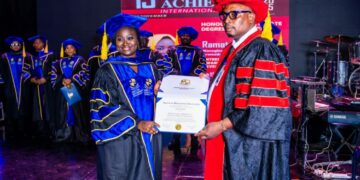The European Union (EU) has proposed opening negotiations with Nigeria on a Science, Technology and Innovation (STI) agreement.
The EU Ambassador to Nigeria and ECOWAS, Gautier Mignot, said the proposed accord will create new pathways for joint research projects, academic exchange and investment in technology infrastructure.
Mignot who stated this at the University of Lagos 18th annual research conference, underscored the role of research in driving inclusive and transformative progress.
He noted that the EU’s partnership with Nigeria is built on shared priorities, empowering scientists, innovators and young researchers to turn knowledge into impact across critical sectors such as Artificial Intelligence (AI), renewable energy and health.
“Science is most efficient when it is universal, not when it bumps into borders.
The European Union and its Member States are investing in research that advances the same green, digital and inclusive transition we are pursuing in Europe, and we are proud to work with Nigeria to achieve this.
“This agreement will help bring our researchers, innovators and universities even closer together. It will strengthen Nigeria’s role in the global innovation landscape and open more opportunities for young researchers and entrepreneurs,” Mignot said.
He also drew attention to the EU’s flagship Horizon Europe programme, a nearly €100 billion initiative that funds research and innovation across continents. Nigerian researchers, he noted, are eligible to participate.
“Horizon Europe is open to Nigerian researchers because the pursuit of knowledge belongs to all humankind,” Mignot said. “When science connects people, it builds a stronger, fairer and more sustainable world.”
Also, the vice-chancellor of the University of Lagos, Prof Folasade Ogunsola, commended the EU for its support, describing the collaboration as a milestone in Nigeria’s drive to strengthen its research capacity and harness innovation for development.
“Africa must embrace innovation that responds to our realities. Partnerships like this enable us to translate research into practical solutions, from sustainable energy to health and AI, that improve lives and empower communities.”
She added that the university is investing in a Human-Centred AI Research Hub focused on ethical and inclusive innovation. “AI offers Africa not just a chance to catch up but to lead in shaping the future,” she said.
Salami Mayowa Michael, a PhD candidate in Estate Management at the University of Lagos, also shared his perspective. “AI is changing everything about how we learn and research. We can now access data, collaborate across continents and even conduct property evaluations with drones.





